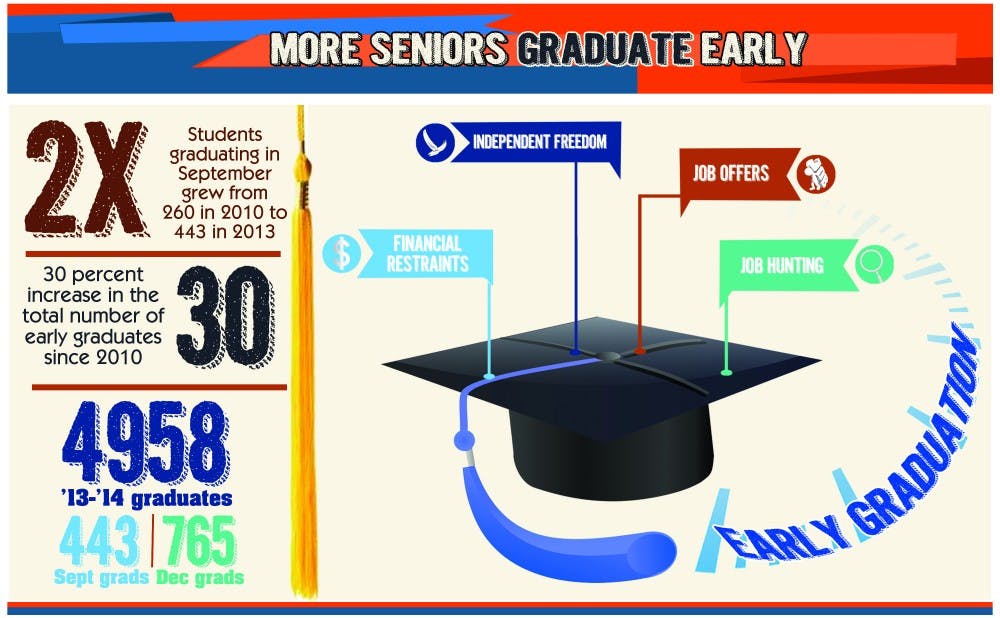The total number of students choosing to graduate a semester early has increased by 30 percent since 2010.
Students who choose to graduate ahead of schedule have the option of getting their degree in September or December. The number of students graduating in September has nearly doubled in the past several years, from approximately 260 in 2010 to 443 last year. The total number of early graduates increased by 30 percent since 2010, meaning that more students are graduating early to save tuition money, start a job or simply take advantage of resources that are harder to access with classes going on.
“A growing trend is possible, especially given the economic downturn and the fact that the middle class in particular hasn’t fully recovered from that,” said Steve Nowicki, dean and vice provost for undergraduate education. “It’s possible that the changing nature of careers is also leading some students to graduate a semester early.”
Among the 4,958 students graduating from Duke in the 2013-2014 academic year, 443 graduated September 2013 and 765 graduated December 2013. Early graduates in 2013 make up 24 percent of the total graduates, compared to 20 percent in 2010.
The top reasons behind early graduation are financial restraints, job offers, job hunting and just wanting to be on their own, said Lee Baker, dean of academic affairs and associate vice provost for undergraduate education.
Nowicki noted that the financial aid policies at different schools are likely to impact students’ college graduation plan.
The number of December graduates from Johns Hopkins University has doubled since 2010, according to an Inside Higher Ed article. Hopkins’ early graduation rate is an outlier that does not reflect the national trend of graduation rates at research universities.
Johns Hopkins does not have financial aid policies as generous as universities like Duke and Columbia, Nowicki said, adding that this could explain why more students there are saving tuition money by graduating a semester early.
The nature of careers is also another influencing factor because a lot of jobs are decoupled from the academic year cycle, Nowicki added. If the choice is between starting the first job and paying tuition for another half year, the cost-benefit analysis is obvious that more students might choose to end their college education early.
Nowicki said students’ decisions of whether to graduate early or not are closely tied to the types of universities they attend. A change in tendency to graduate early is more likely to be seen in state schools where credentials are more plugged into specific careers such as journalism or sports management, than in highly-selective liberal arts schools such as Duke.
He added that having students graduate early would not necessarily impact the University in a bad way, but it would be unfortunate if early graduation hinders the student’s development as a “broadly educated citizen of the world” into which they are graduating.
“I don’t think finishing in three and a half years would matter. Simply shortening that arch of the education by a semester would not be a problem,” Nowicki said. “But the impact would be negative if there are forces that lead students to be less of a part of the Duke community.”
Although some people in academia argue for a three-year college plan, Nowicki said graduating early disallows students from fully exploring the resources of a liberal arts education.
Baker added that the University has loosened its policy on granting seniors part-time statuses that allow them to pay half tuition for two courses or less in their last semester. Students were required to declare that they are going part time in April the previous academic year. Now, seniors are allowed to declare part-time up until the beginning of classes, which has led more students to take that option, he said.
“Liberal arts schools that are residential and private tend to develop a sense of cohort among classes. Students want to graduate with their class,” Nowicki said. “This might go away someday, but it will change most slowly in a place like Duke. I would imagine that for some of our students that last basketball season would be a little part of the calculation because if they graduate early, they can’t go to the games anymore.”
Get The Chronicle straight to your inbox
Signup for our weekly newsletter. Cancel at any time.

